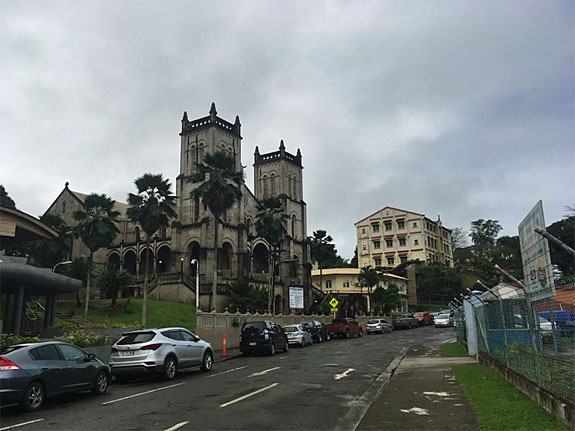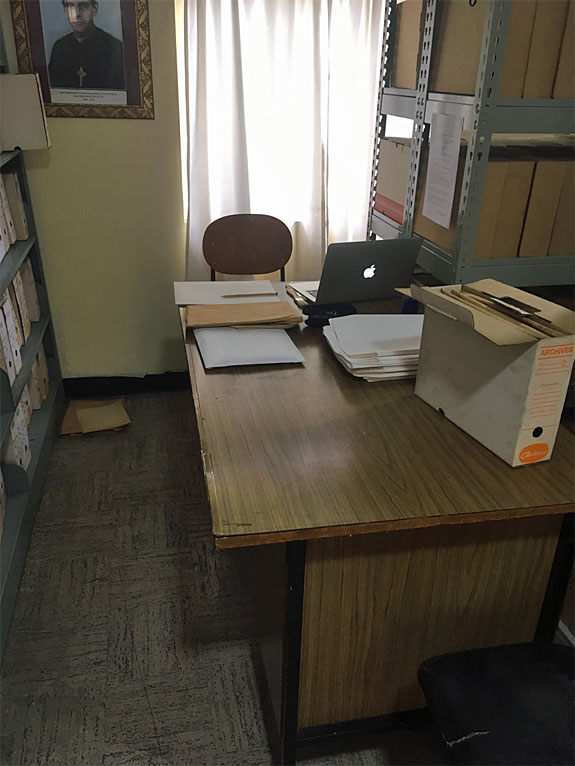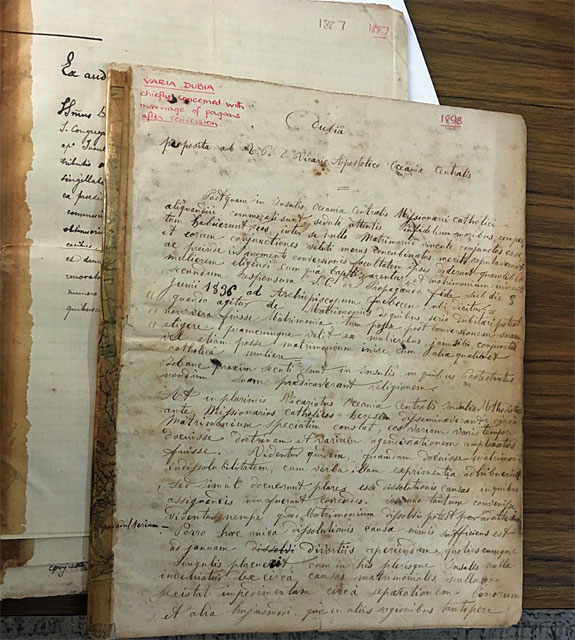The Roman Catholic Archives of Fiji Collection Project Diocese of Fiji, Suva, Fiji, August 5-12, 2019

Returning for a sixth visit to Suva, Fiji, I found that coming in August was a bit different than visiting the city other times of the year. The weather was cool and rainy. Although Suva is no stranger to rainy days, it was actually quite surprising to see many of the locals wearing sweaters and hoodies. It was certainly not the image of the idyllic, warm South Pacific Island. Nevertheless, I made the most of the cooler weather and actually found it easier getting around the city as I typically walk from place to place. The cooler weather also made the working environment less oppressive than working when the air is heavy with intense heat and humidity.
The project at the Fiji Diocese Archives was focused on one of the archive's most important collections- The Roman Catholic Archives of Fiji (RCAF). The collection consisted of mostly records from 1844 to 1980. This time span covered such significant periods that included: the Missionary Period, pre-colonial, Colonial, Independence and Modern Times. Thus, the project was to review, clean, and file in acid-free envelopes. Once the preservation was done we created a box list for each box. The project also included training and working with Katherine Foi on preserving and processing records. Katherine teaches special education at the Marist Champagnat Catholic School, and has a keen interest in the Catholic history of Fiji. After the project, Katherine will be able to continue the good work in the archives and train future diocese staff members and volunteers when it comes time to preserve other Diocese collections and records that are deposited at the archives in the near future.

There were a few specific outcomes that RCAF Project produced over the course of the project. The first outcome was that the project allowed the Diocese to take intellectual and physical control of the collection. It was a rather large collection, and we anticipated that much of contents of approximately 265 boxes needed preservation. Indeed, this was the case. We gave extra care to records such as old letters, hand-drawn documents and maps, and land lease agreements. At the moment one of the major problems that the staff was currently having is that it was difficult to find a requested item in the collection. Thus, we created a box list that will help find material quicker. Once control of the collection is taken through processing and preservation, then access for employees and researchers will be easier.
The second significant outcome of the project was the training of staff in archival functions, particularly in the areas of appraising, processing and preserving of records. At the moment the Archives is looked after by one person, and by Katherine Foi, a qualified volunteer on occasion. Learning how to perform these basic archival activities will allow the staff and volunteer to apply their knowledge to future collections. In turn, they will be able to train new employees or volunteers. Training the basic archival functions is important. For example, the Fiji Diocese Archives is composed of one room and space is very limited. Crowded records can easily compromise their longevity. However, new knowledge on appraising and preserving collections coupled with a new records management plan, should help to free space and maintain a manageable repository until a new site for the Archives is located.
One outcome that will need to be established in the near future is the creation of much needed policies. For example, a Collection Policy will give clear guidance to archive donors about the kind of material that the Diocese Archives seeks to acquire, the methods by which it does so, and how the collections are managed and access. A Collection Policy in conjunction with a Records Management Policy will help control the influx of records, which can be quite overwhelming for a small staff. The policies will help keep the archives from overcrowding and will keep records from being stored on the ground. A Preservation Policy will also help define the Diocese Archive's preservation responsibilities, and to provide guidance to the staff in making decisions and undertaking other activities that may have an impact on collections. Suva, Fiji, is in a very volatile part of the world. The effect of climate change has become quite worrisome over the past decade. As rising sea level concerns are heightened, a Disaster Management plan that is tied-in with a Preservation Policy is also of high importance.

All in all, the project got off to a fantastic start. In one week's time Katherine and I processed 90 boxes. As we processed the collection, we identified records that will need immediate digitization especially when digitization tools are acquired for the archives. These records included fragile Baptism, Marriage and Confirmation records from the 1800s. Other records recommended for digitization were the Sacred Heart Gazette and the Cathedral Newsletter. Several unique and rare books written in Fijian were also recognized and noted for digitization in the near future. There is still much to do and when time and funding become available, I will be able to go back and carry on the good work. In the meantime, much of the work will have to be achieved by Katherine on a part time basis. It is a daunting task to turn the Diocese Archives into a fully functional place for safekeeping its collection, as well as being a research facility, but I look forward to the challenge and cannot wait to preserve and process other collections. The Diocese Archives truly contains an intriguing insight of Fiji's cultural and religious history.
I would like to give a special thanks to the staff of the Diocese of Fiji and the National Archives of Fiji for all their support during the project!
